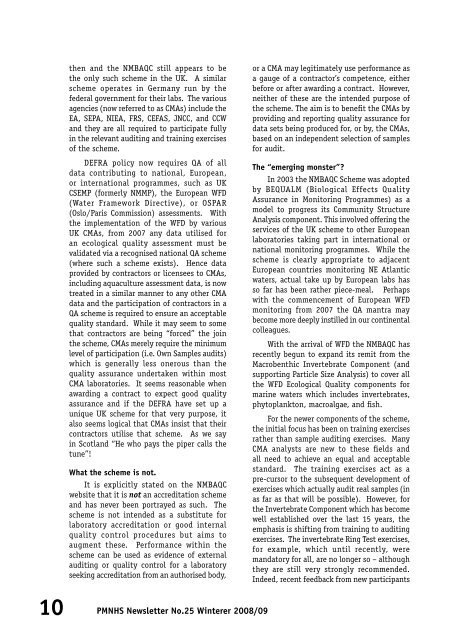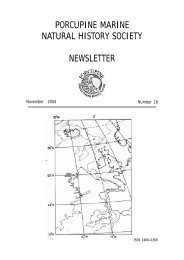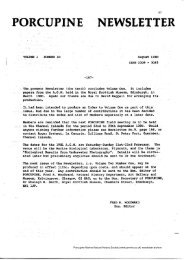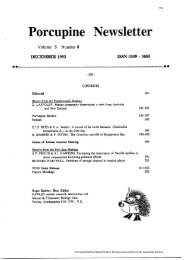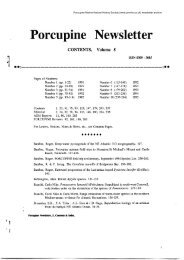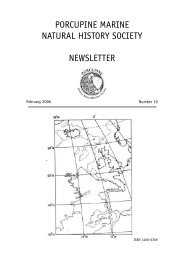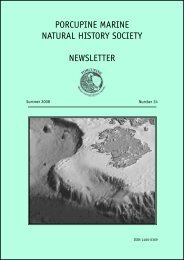Porcupine Newsletter Number 25, Winter 2008/09.
Porcupine Newsletter Number 25, Winter 2008/09.
Porcupine Newsletter Number 25, Winter 2008/09.
Create successful ePaper yourself
Turn your PDF publications into a flip-book with our unique Google optimized e-Paper software.
10then and the NMBAQC still appears to bethe only such scheme in the UK. A similarscheme operates in Germany run by thefederal government for their labs. The variousagencies (now referred to as CMAs) include theEA, SEPA, NIEA, FRS, CEFAS, JNCC, and CCWand they are all required to participate fullyin the relevant auditing and training exercisesof the scheme.DEFRA policy now requires QA of alldata contributing to national, European,or international programmes, such as UKCSEMP (formerly NMMP), the European WFD(Water Framework Directive), or OSPAR(Oslo/Paris Commission) assessments. Withthe implementation of the WFD by variousUK CMAs, from 2007 any data utilised foran ecological quality assessment must bevalidated via a recognised national QA scheme(where such a scheme exists). Hence dataprovided by contractors or licensees to CMAs,including aquaculture assessment data, is nowtreated in a similar manner to any other CMAdata and the participation of contractors in aQA scheme is required to ensure an acceptablequality standard. While it may seem to somethat contractors are being “forced” the jointhe scheme, CMAs merely require the minimumlevel of participation (i.e. Own Samples audits)which is generally less onerous than thequality assurance undertaken within mostCMA laboratories. It seems reasonable whenawarding a contract to expect good qualityassurance and if the DEFRA have set up aunique UK scheme for that very purpose, italso seems logical that CMAs insist that theircontractors utilise that scheme. As we sayin Scotland “He who pays the piper calls thetune”!What the scheme is not.It is explicitly stated on the NMBAQCwebsite that it is not an accreditation schemeand has never been portrayed as such. Thescheme is not intended as a substitute forlaboratory accreditation or good internalquality control procedures but aims toaugment these. Performance within thescheme can be used as evidence of externalauditing or quality control for a laboratoryseeking accreditation from an authorised body,PMNHS <strong>Newsletter</strong> No.<strong>25</strong> <strong>Winter</strong>er <strong>2008</strong>/09or a CMA may legitimately use performance asa gauge of a contractor’s competence, eitherbefore or after awarding a contract. However,neither of these are the intended purpose ofthe scheme. The aim is to benefit the CMAs byproviding and reporting quality assurance fordata sets being produced for, or by, the CMAs,based on an independent selection of samplesfor audit.The “emerging monster”?In 2003 the NMBAQC Scheme was adoptedby BEQUALM (Biological Effects QualityAssurance in Monitoring Programmes) as amodel to progress its Community StructureAnalysis component. This involved offering theservices of the UK scheme to other Europeanlaboratories taking part in international ornational monitoring programmes. While thescheme is clearly appropriate to adjacentEuropean countries monitoring NE Atlanticwaters, actual take up by European labs hasso far has been rather piece-meal. Perhapswith the commencement of European WFDmonitoring from 2007 the QA mantra maybecome more deeply instilled in our continentalcolleagues.With the arrival of WFD the NMBAQC hasrecently begun to expand its remit from theMacrobenthic Invertebrate Component (andsupporting Particle Size Analysis) to cover allthe WFD Ecological Quality components formarine waters which includes invertebrates,phytoplankton, macroalgae, and fish.For the newer components of the scheme,the initial focus has been on training exercisesrather than sample auditing exercises. ManyCMA analysts are new to these fields andall need to achieve an equal and acceptablestandard. The training exercises act as apre-cursor to the subsequent development ofexercises which actually audit real samples (inas far as that will be possible). However, forthe Invertebrate Component which has becomewell established over the last 15 years, theemphasis is shifting from training to auditingexercises. The invertebrate Ring Test exercises,for example, which until recently, weremandatory for all, are no longer so – althoughthey are still very strongly recommended.Indeed, recent feedback from new participants


